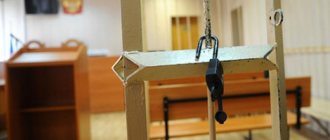Period of settling into the cell. Features of behavior
It is believed that the most difficult test for a prisoner is meeting convicts. In the zone, this stage is called “registration”. In our article, you can find out not only how to survive in prison, but also how to properly get to know the convicts so that the term of imprisonment does not turn into a series of serious trials.
It is important to know how to behave when meeting convicts. In each prison, “registration” is completely different. As a rule, a beginner is asked questions with meaning. It is for this reason that you need to be careful and not say anything unnecessary. Under no circumstances behave aggressively towards other convicts, even if you are an athlete and confident in your abilities. This is no coincidence, because in prison everyone lives “by rules”, and any thoughtless word towards a local authority can result in a series of trials for you.
When entering the cell, do not rush, walk at a slow and measured pace. It is imperative to say hello and get to know everyone. It is worth paying attention to the fact that when meeting convicts for the first time, you should under no circumstances extend your hand to shake hands. This is no coincidence, because in prisons there are categories of citizens who are not greeted in this way.
The recommendations that are described in our article will allow you to figure out how to survive in prison. Thanks to them, if you are convicted, you will be able to quickly adapt to the zone and preserve your physical and mental health as much as possible.
Coronavirus in the colony
Still, the fact that due to quarantine the prisoners did not see their relatives in person affected their general mood. Many people have a date three times a year, and the absence of one is serious. For them, this is the only ray of light; after all, relatives can come - wife, children, mother, grandmother. We didn’t want to disrupt their connection with their relatives, so we had meetings via Skype so that they could at least see them on the screens. Mail was sent to them and parcels by mail were allowed. And so, in order to [receive] a parcel from the hands of relatives who came, this was prohibited.
It cannot be said that there are more conflicts between prisoners and the administration against this background. We explained the situation to the convicts, and on TV it was all clear that this was not some kind of invention of ours, but this was the situation in the country. Somehow we managed to explain to them that this is a temporary measure and they will have to comply with it. The situation in the country was such that we, the employees, suffered, the prisoners too, and in principle this affected everyone. In principle, the prisoners reacted with understanding.
Article “This is really a collapse.” Kazakhstanis talk about the second wave of coronavirus
The quarantine also affected us. We were forbidden to even visit relatives or travel outside the city. Home-work-home. I constantly had to change clothes. It turns out that the things we wear at work remained at work. When we left home, we changed into a different uniform. There were also restrictions for those who, for example, work outside the zone, at headquarters. We determined a circle of people who could not enter the zone; they only worked at the headquarters. And those who worked in the institution itself go in there and only leave in the evening in order to limit all possible contacts and not introduce the virus.
In the morning, they checked the temperature as required: if it was above 37 [degrees], then they were not allowed into the territory of the institution. There were several such cases, people were simply sent to the hospital immediately.
Features of communication in prison
Few people know, but prison has its own rules of communication between convicts. If a newcomer does not comply with them, then he risks falling into the caste of the socially unadapted. As a rule, criminal authorities do not accept such convicts and humiliate them every day. First of all, you need to remember a few features.
Under no circumstances should you say the words “thank you” or “offended” on prison grounds. The use of profanity is also prohibited. This is not accidental, because you can accidentally offend a person respected in prison and thus lower your authority. It is also worth noting that in the zone all convicts use slang. It is for this reason that at first it will be quite difficult for a newcomer to understand what his cellmates are talking about.
If, through your own or someone else’s fault, you have ended up in prison, we strongly recommend that you follow the prison rules. Thanks to this, you can earn authority.
From scrip to prison: what you can’t talk about and how not to get caught in the “sixes”
Having lived in three Zakamsk pre-trial detention centers and a Nizhnekamsk colony, Sergei Eretnov spoke about prison life and the life of prisoners Photo: Oleg Spiridonov
SMOKES CONVERT FREE, TEA IS BY AGREEMENT
Often, the person under investigation spends many months, or even years, in a pre-trial detention center cell, waiting for a court decision and with it another 20 people. Every day in the cell begins with cleaning - washing the floors, toilet, sink. The prisoners themselves do this, having determined the order of duty. You can refuse to clean - no one will force you, but is it worth opposing yourself to everyone? Usually only older people are not involved in duty. The administration provides all the tools and supplies needed for cleaning. In Chistopol, for example, the head of the pre-trial detention center is so passionate about order that the employees themselves go through the cells asking who needs what to maintain cleanliness. Cleanliness is the main rule of prison life, both in the cell and personally. If someone starts to smell, they will reprimand him for not washing his hands after using the toilet - “go wash it.” One way or another, the dirty roommate will be forced to wash himself. Since assault is prohibited, they can hit you with a basin if you really don’t understand the words. It's not so much painful as it is humiliating.
There are no exercises or morning walks here; prisoners wake up at whatever time they want, just before the morning divorce. Prisoners are counted in the morning and evening. There is nothing to do in the cell, so everything is constantly being erased. If you want to get a haircut, you turn to the supervisor for the scissors; in general, you can contact him for any similar reason. In addition, household or personal care items are sold in the prison store.
Money is prohibited in the zone, but every prisoner has an account. This store does not have a display case - there is a list of goods from which you can order: groceries, cigarettes - in general, everything you need is there, the list is extensive. The assortment, of course, is not very diverse - for example, there are not 20 types of gingerbread, but one, but there are enough product categories.
Cigarettes remain the main currency in domestic circulation. When I got here, I once again congratulated myself on not smoking. Even financially secure prisoners experience difficulties with smoking - they are shot at. This, of course, is not accepted, but what remains for those who have no money at all? No one will say a word about refusal, of course, but there are almost no overtly rich people in the zone, and most prisoners have very, very limited opportunities - relatives do not send money, they do not send large parcels. Cigarettes can be used to pay for services. For example, prison hairdressers work for cigarettes and sweets. In the Nizhnekamsk camp there were three of them with professional hair clippers, each with several clients every day. Hairdressers don't know the need.
Tea is also a currency, but not a clear one, we need to negotiate. Many people drink chifir, but I would advise you not to forget that it is harmful. I didn’t chifir myself.
DON'T BE OPEN WITH CRIMINALS
It is better to share transfers from the outside, although no one obliges you. What and how much a prisoner will allocate “to the common fund” depends only on him: you can pour some tea, you can treat him to sweets. No one will take anything without permission, unless there is a special mutual understanding in the cell or room. The easiest way, by the way, is to receive parcels through the temporary detention center when you come to investigative events - you should warn your relatives to bring them there. When you arrive from a temporary detention center with a parcel, it is not inspected again - it is considered that it has already been checked. In some cases, this matters - in particular, you can get the cigarettes through intact, otherwise during inspection in the camp they are often broken.
By and large, there are no taboo topics for conversation behind bars, but there are topics that are best avoided. I would not recommend talking about your relationships with women. There are people who are interested in this after a long celibacy - they can spin it for frankness, and this is fraught. In general, you shouldn’t reveal too much, especially from those sides that don’t concern anyone. There have been cases when, due to careless statements, a person ended up in a cell with “lowered” ones. I’ll tell you how an ordinary village boy of about 25 got into trouble. They asked him how things were with his wife, would he wait? It will, he says. Do you like kissing? We love you. Do you have oral sex? Not without it. And that’s it - the guy went to another cell, because he admitted that first his wife stimulated him orally, and then with the same lips... In general, there is no need to tell much about yourself - people are still strangers, criminals. If provocative questions are too persistent and alarming, you can simply ask: “For what purpose are you interested?” Let them first explain what the questions are for.
Whether to talk about why he ended up in a pre-trial detention center (or in a camp) is up to everyone to decide for themselves, but asking about it is not very polite. If they do ask, then there is no point in hiding it - they will find out anyway. The shameful article will appear immediately, but now there are few of them left. About 20 years ago, life was difficult for a rapist in the zone, but at some point there were too many prisoners jailed for rape. They stopped standing out. The article, of course, still remains disrespected, but people in the zone have now begun to figure out on an individual basis whether you really are an animal or a victim of circumstances. There were many cases when girls wrote statements because of some grievances that were not related to violence. We had a guy who “raped” his wife. But a real rapist may well be transferred to the “dead” at the request of prisoners - for example, there was a man who was imprisoned for 11 years for raping minors. Having received a sentence from the state, he lives in the camp like hell, actually paying for the crime twice as much. In this I see the highest justice.
Caution in conversations about the article and your criminal case is especially important at the stage of the temporary detention facility, because here there may be a decoy provocateur among the cellmates. People from the street are sitting in the temporary detention center; it’s easier to place an employee here - there’s no need to open a criminal case. In addition, the investigators’ interest in the prisoner’s frankness is at its most lively at this time. A person does not appear in a pre-trial detention center out of the blue, he is already under investigation, but in the camp there is no point in planting an agent - everyone there is already convicted.
A HUNGER STRIKE IS NOT THE BEST FORM OF PROTEST
Of course, special slang also exists in the camp for first-timers, but it is not as developed as in the zones for experienced campers. Well, for example, a person prone to deception, who is not very decent, can be characterized as “curly-haired”, and it can be said about him that he “braids curls.” It’s not a stigma and doesn’t seem to be offensive, but everyone understands what it’s about.
Gambling is regulated. If a newcomer is offered to play for fun, for example, cards, then the game is allowed only with what he has on him. Playing in debt is prohibited in principle - not only agreeing to it, but also offering it if the initiator knows that there is nothing to pay with. Before the game, you need to show what you are playing for - only someone who is trusted at his word, who is known to be responsible for his words, can ignore the rule.
Requests like “go and get me something” should be refused in most cases. A person with whom you have a trusting relationship can ask, and that’s normal. There is also no shame in helping an elderly person. You need to feel the line between a friendly request and exploitation. Requests for certain services require a reason; an overly executive person can easily acquire the label of “six”. At the same time, there are certain responsibilities that need to be treated with understanding. For example, in a pre-trial detention center at night, ropes are stretched between the windows along which mail moves. This is called "road". Someone has to sit up half the night and watch the “road.” This method of communication is officially prohibited, of course, but since there is nothing wrong with it, prison administrations allow it. Young people sit on the “roads” - people over 40 are automatically exempt from this duty.
It hasn’t happened to me, but there are still circumstances when you have to firmly protest against the actions of the administration. If it has come to this, I want to warn you that a hunger strike is not the best form of protest. Today there are ways to force feed, pump nutrients into the body. If you nevertheless decide to go on hunger strike, the first thing you need to do is write to the prosecutor about this, submitting a statement through a lawyer. But in general, if the situation is ripe, no matter how crazy it may sound, it’s easier to “open up.” Experienced prisoners, by the way, know how to open themselves in such a way that the threat to life is minimal. I have already written that in the zone there are always people ready to open their veins for the common good, although in Tatarstan they try not to let prisoners do this.
Next time, in the final part of the series about prison, we will talk about the differences between the three Tatarstan pre-trial detention centers and the main systemic problem of the regional Federal Penitentiary Service.
Sergey Eretnov
Prison tattoos
It is no secret that convicts often get tattoos on their bodies. Few people know, but each drawing has a separate meaning. Prison tattoos allow you to learn more about the views on life of a particular convict. You can find their detailed decoding in our article.
It is not uncommon for prisoners to see a tattoo of five dots on their arm. As a rule, it is stuffed at the base of the thumb. Such a tattoo is a kind of symbol that indicates that the person was in prison.
The most popular prison tattoos are epaulets. As a rule, such a pattern is located on the shoulders. It can symbolize that its owner completely denies any power. Often such convicts do not obey the supervision inspectors and start a riot.
On the territory of the prison you can meet prisoners with a rather unique tattoo, namely a dot above the eyebrow. Such a symbol indicates that its owner belongs to the group of socially maladapted people. As a rule, they are subjected to constant violence and humiliation within the zone.
Prison Diary, Part I
The Free Press begins publishing the “prison diary” of a man who is still involved in a criminal case with “economic implications.” For obvious reasons, we do not indicate his real first and last name. Today “SP” is publishing the first part of the notes, and a total of 5 chapters will be published.
Do not renounce the scrip and prison. They say this is a purely Russian proverb... The author of these lines was an ordinary middle manager in an ordinary Russian medium-large company. And suddenly he found himself, first, simply as a defendant in a high-profile criminal case, and then as an inmate of one of the Moscow pre-trial detention centers, where he spent more than a year. These notes were also written there.
Let's leave the question of guilt or innocence aside - the trial has not yet taken place, and a return to normal life turned out to be possible as a result of the notorious humanization of legislation on economic crimes.
Here is a story about the first two weeks of prison life - the most important, from the author’s point of view, in order to remain human behind bars.
“Well, another day is over. He passed completely empty. Unless, of course, you consider that Thursday is a bath day, and I finally washed myself off after everything that happened. Now, at least, I feel that I am in a more or less clean state.
I must say that most of the time I feel pretty decent - I only unravel a little when I remember home. True, I often don’t allow myself this - 2-3 times a day, no more.
The most disgusting thing about all this is that, being here, you are completely deprived of any freedom of choice. Not even freedom of choice, but freedom of action and decision-making. This kind of helplessness is the worst.
Of course, I came up with some activities for myself, but with 10 people in an eight-person cell - it has a total area of 25-30 meters, you can do something more or less freely and seriously for an hour and a half or two, no more.
One of the things I did before I forgot was to write down how life was in those first days.
I was arrested in the afternoon - I left the office to have lunch. I was about to go down into the underground passage through the Garden Ring - two people in civilian clothes appeared ahead, they waved a book and said something like “don’t twitch.” At the same time, someone grabbed my hands from behind and I found myself being pulled into an ambulance parked right there.
The first feeling is panic. Who are these people, what do they want? Why Ambulance? Maybe this is a mistake (I’ve already been mistaken for someone else a couple of times)? In general, I started screaming and struggling. At the height of the day. On the Garden Ring... I must say that I scattered two. True, as it turned out later, there were four behind...
It turned out not to be a mistake. I still don’t understand why it was necessary to stage a show with a forceful seizure on the street - it was much easier to call him in for another interrogation. I would have come anyway. Just like I came to all the previous ones...
In the night, after the investigative actions were completed and it was announced to me that I was detained for 72 hours, in the same ambulance in which they had been transporting me all day, I was sent to Petrovka to the detention center. By that time, I had already developed strangely friendly relations with the riot police who detained me - it seemed that they, too, were slightly stunned by the spectacle that was organized during the arrest and everything that followed.
They were told that they would take a seasoned, especially dangerous criminal who would resist, try to escape, etc. As a result, they assigned about 10 people to me, who surrounded the office in a circle and waited for almost two days. The funny thing is that they were waiting for me during working hours. During these two days I updated the strategic plan for the Management Board and was stuck at work from 7 am to 12 midnight. Managed…
In general, they brought me to Petrovka and tried to drive directly into the territory in this ambulance. Of course, they were not allowed through. Jokes immediately began like: “We can’t hand you over, so come on, run; “We haven’t practiced shooting for a long time.” The most interesting thing is that I laughed it off. And it seems quite adequate.
It turned out to be a very interesting thing. Since I didn’t feel any guilt at all (and at that moment I didn’t understand at all why it all started), I perceived, and still perceive the situation very detachedly - this is how, they say, I’m having a difficult business trip; maybe even long...
No, it’s already clear that it’s a long process... In general, my main task here is to fight for my good name. God knows, maybe it will work out. In any case, I hope I don’t lose my mind like some people do. Although, I can’t say that everything is right in my head now either. The text is completely uncharacteristic for me. And it's hard to concentrate.
Okay, to Petrovka. We drove away from the barrier, and the driver changed the usual white license plates to blue police ones. We tried to drive up again with these numbers, but they still wouldn’t let us in. As a result, a sensible idea appeared - to take me through the main entrance on foot.
That's what they did. I walked the same way as everyone else, without handcuffs, about the same dimensions as the SOBR officers surrounding me. As a result, at the checkpoint, in response to the elder’s phrase that they had brought a detainee, the duty officer directly asked: “Who is the detainee?”
We entered the territory and walked through the yard. I remember being surprised by how many new Ford Mondeos were there without license plates - they had clearly purchased a new batch of cars for the leadership of the Moscow City Internal Affairs Directorate.
Well, then, I was handed over to a temporary detention center. After surrendering, they took me in for a personal search. There was also a doctor sitting there - God's dandelion (or, as I was later told, a paramedic). She carefully wrote down all the ailments I listed and said: “You know, it’s contraindicated for you to be here?!” I looked back at her and asked: “Do you know the person who SHOULD be here?” The granny laughed and said that she had never heard such a funny answer.
I was taken to the floor, to a cell. Nothing interesting happened on the way - I walked into a long corridor, was taken into a small room and told to take a mattress, pillow and blanket. I took it and went. They took me to a three-person cell; about 5x1.90 meters in size. There was one guy sitting there.
You shouldn't be surprised by such precise dimensions. Most of the time there is nothing to do in the cell anyway, so you do calculations in your head. The initial message is very simple - a standard sheet of A4 paper - 21 by 30 centimeters. That is, you immediately get sizes 9, 21, 30. Well, then, it’s a matter of technique - you measure the bed and measure it in beds.
They turned it on, of course, after lights out, but it turned out that the lights in the isolation cells were on around the clock and did not change depending on the time of day. Yes, and in general, time of day, especially in a temporary detention facility, is a relative concept. There is a window, but it is covered with “eyelashes” - iron strips welded on in a herringbone manner. Light practically does not penetrate through this; seeing something through the window on Petrovka is unrealistic.
No one in Petrovka has a watch (here, in the pre-trial detention center, it’s easier; officially, almost no one has a watch either, but there is a clock on the TV). Therefore, the only way to determine the time is to listen to the radio (if, of course, it is turned on, which, again, does not happen every time).
The daily routine in the temporary detention center is as follows (in the pre-trial detention center it is completely different, although the routine is formally the same): At 6 am - get up. Simultaneously with the rise, wired Radio Russia is turned on. Getting up means no longer lying on the bed covered with a blanket. You can just lie on a made bed and sleep. Then they come and collect waste (precisely waste - as “knowledgeable people” explained, the garbage comes for this waste). Next - breakfast. The “official” dishes are handled as follows: Everything is exclusively aluminum. They give you a mug for the entire duration of your stay on the floor (though this thing was a mug in infancy until the handle was torn off from it). The bowl is given out in the morning and taken away in the evening; spoon - during meals. If something was passed down by relatives (ideally a set of children's plastic dishes), then it can be used around the clock.
Sugar and bread are provided for breakfast throughout the day. Sugar - a measure of about two tablespoons. Moreover, if you haven’t figured it out, they pour it into a “mug” and immediately pour it over with tea. If he realizes and substitutes, for example, a newspaper, they pour it onto the newspaper. Bread per day is given out half a loaf of white and half a loaf of black. This bread has funny names. The loaves are “Molodetskie”, and the black bread is “Healing”. Accordingly, for breakfast they throw in some porridge with stewed meat (it feels like there are two cans of stewed meat per insulator).
We had breakfast, handed over the spoons - at about 10 am the check came. Quite a fun event too. When opening the door, you need to stand up and fold back (roll 30 percent) the mattress off the bed. By the way, the bed (bed) is a metal structure welded to the floor with a bed size of 65 by 180 centimeters.
Then, at about 12 o’clock, a round comes - you can ask to call a doctor to give him pills (he has a minimum of his own pills, but if relatives pass them on, then the pills are given out for a day). Then, at 12 o’clock, the radio is turned on for another 2 hours. They turned off the radio and started serving lunch - soup, some main course and boiling water. We ate and waited for dinner; they started serving it around half past seven. Again some food and weak tea. In principle, all the food is quite edible, but no other epithets other than “edible” come to mind. In a pre-trial detention center, food is, again, different, but more on that later.
At eight in the evening they turn on the radio again and play it until lights out, that is, until ten in the evening. After that, you can crawl under the covers and wait to see who will be “pulled out” to the pre-trial detention center today - people are kept in temporary detention centers for more than 10 days in exceptional cases, and people are collected at night.”
(Read the second part of the notes from the pre-trial detention center tomorrow, March 1).
General information about prison concepts
If you do not want your life in the zone to turn into a series of humiliations and trials, then you need to respect the local rules. It is no secret that convicts in prison set their own laws. You can find out their features in our article. We strongly recommend that you study them.
Thieves' concepts and their observance will allow you to take your rightful place in the prison hierarchy. Few people know, but all those convicted belong to one caste or another. In general, all prisoners can be divided into lawbreakers, authorities, socially maladapted and statistically average. The most important place in the prison hierarchy is occupied by authorities, but socially unadapted prisoners are constantly subjected to humiliation and violence. It is worth noting that not all newly arrived convicts know that thieves’ concepts prohibit eating food from the parcel on their own. The prisoner must share food in order to avoid conflict situations in the future.
It is worth noting that sexual topics are under no circumstances allowed to be discussed on prison grounds. This is not accidental, because convicts who live by the rules react aggressively to certain types of sexual contact. Any thoughtless word can result in a bad reputation.
Troubleshooting rules
In our colony, searches are carried out every day. How it works: there is a certain number of squads and a schedule for how we check the squad today. We conduct a complete search of convicts, search their belongings and premises. This is done every day, but not throughout the entire colony, but according to a schedule. The schedule is always drawn up in such a way that the convicts cannot find out which squad and on what day we will be checking.
Mostly there are things that convicts are not supposed to have. They are not prohibited, as it were, but they do not have the right to have them with them. Most often, we know in advance where and what may be hidden. For this purpose, there is an operations department that collects information through its connections. Prisoners who work for the administration help with this. Someone himself comes and says that he is ready to work for the institution. Someone has to be recruited. Not all of them, but they have to. Because, for example, there is a detachment, and it has a supply manager - a person who leads this detachment. It’s the same as it happens in the army: there is a platoon and there is a platoon commander. Also here there is a caretaker who supervises them. The administration chooses him. Usually we appoint a person whom the prisoners will listen to and with whom it will be more convenient for us to work.
Prisoners have extremely sophisticated ways of hiding something, starting from the fact that you can open part of the baseboard and there will be a small storage room there, and you won’t be able to see it by eye unless you know specifically where the thing is. A couple of years ago, we brought troops into the colony and did a full search, with special equipment in order to find means of communication. Then caches were found in places where it was impossible to even imagine. Elementarily in the arm of a chair, in the baseboards, walled up in the wall, and the like. In this regard, they manage to hide it in such a way that you cannot find it without equipment.
Illustration: Anya Leonova / Mediazona
Prison jargon
As we said earlier, prisons have their own language jargon. In our article you can find out the meaning of some words and phrases.
On the territory of the prison you can often hear the phrase citizen chief. It has several meanings. First of all, this phrase is used when addressing surveillance inspectors and security. In this way, the convicts demonstrate their respect for the administration. As we said earlier, the phrase “citizen boss” is used in different variations. This is often addressed not only to the administration, but also to prison authorities.
On the territory of the zone, the convicted person may be offered chifir. Few people know, but this is a strong tea that includes a large amount of tea leaves. As a rule, it is drunk by prisoners who do not want to go to bed.
It is worth noting that you should never steal on prison grounds. In the zone, such people are called rats. As a rule, such prisoners are subjected to constant violence and humiliation.
Tattooing in prison conditions. Past and reality
Not everyone can withstand life in the zone. The reality is shocking. In fact, there is unsanitary conditions and lawlessness in the colonies. As we said earlier, almost every prisoner has a tattoo on their body. Is this procedure safe in a prison environment? You can find out this and much more in our article.
During Soviet times, getting a tattoo in a zone was extremely dangerous. Ink or soot was used as paint. Instead of a needle, which, by the way, is a prohibited item, staples from notebooks were used. Today more professional tools are used. Due to the unsanitary conditions that are present during the process of applying drawings to the body, prisoners run the risk of contracting serious infectious diseases.
Prohibited items
Life in the zone is a serious test for a prisoner. In order not to conflict with the administration, you need to know the rules of conduct in prison. In our article you can find out which items a prisoner should never have in his possession.
Supervision inspectors are required to confiscate prohibited items from convicts. These include drugs, phones, alcohol and weapons. If a prohibited item is found on a prisoner, he is placed in a punishment cell for an indefinite period. After this, life in the zone for the violator turns into a series of trials.
"I was scared"
I have been working as an inspector of the duty unit in a maximum security colony for three and a half years. I came to this system even earlier, before that I worked in Almaty, but in probation. I went to this job purposefully. After school I studied at the academy for four years and immediately knew that I would go to work in this system.
Now my responsibilities include full control of the institution: the daily routine, conducting inspections and public events, including lunch and dinner. The entire day the prisoners are monitored by the duty unit, and I am in direct contact with them. I go to work every day from eight in the morning to seven in the evening, but sometimes I work for a day. In such cases, you simply don’t get enough sleep, because your emotions and nerves are tense, any rustle and you wake up immediately. As a result, you don’t get enough sleep, no matter how much you sleep there.
It’s difficult to say at what time of day it’s more difficult to work; after all, no one sleeps during the day, and different situations happen, someone creates problems and the like. But if something happens at night, then the duty officer is directly responsible for it. Whatever happens at night is practically an emergency. And decisions must be made independently, since there is no boss at this time.
ArticlePrisoners bang their heads against doors. In Kazakhstan, colonies are trying to sue an activist who talks about torture and hunger strikes
I remember what impressions I had in the first days of working in the colony. We have such an institution that when you enter, it is not that every convict is sitting in a cell - they can walk around the territory of the institution. Of course, there are fences, but they move freely inside. To be honest, at first I was very scared, because there are people around you who committed various crimes, there are terrible articles there... I read their personal files, and you will never imagine in your life that this even happens. But over time, you somehow get used to it and understand that they do not pose a threat, and there is no point in provoking the administration.
Among the prisoners, yes, there are good people. Well, life circumstances are different. Most of them, of course, are not the best people, so to speak, the dregs of society.
Indeed, after three years of work, I am no longer surprised by ripped veins and sewn-up mouths. I see this as a way to get the administration's attention. If the prisoners have any complaints against the institution, and they write them like this... complaints, then few people pay attention to this. Well, they go and go, let them write. And to really get some attention, a prisoner can go on a hunger strike, he can sew his mouth shut, he can cut himself, he can swallow something. After this, the administration of the institution needs to take action. So yeah, it's basically a way to get attention because they're doing it with purpose and their goal isn't suicide or anything like that. They do this so as not to harm themselves. They know how to do it without dying.
Illustration: Anya Leonova / Mediazona
Items of prison production
Most of the convicts work in the zone. Almost every prison has a huge variety of production machines. Thanks to them, convicts can not only work, but also receive wages for this. As a rule, prisoners sew uniforms and create forged and wooden products. Those convicts who can draw well make paintings and icons. Subsequently, handmade items are exported. They are in great demand. This is no coincidence, because the price of the finished product is quite low, but its quality will please even the most demanding buyer.
Types of prisons
There is a certain classification of prisons among inspectors and prisoners themselves. The black zone is limitless. Convicts who are on its territory freely use mobile phones and can even afford drugs and alcohol. As a rule, sooner or later all employees of such a prison become convicted.
Another variety is the red zone. On its territory, prisoners are completely under the control of inspectors. Riots often occur in such prisons. Convicts protest against the administration. They go on hunger strikes, run away and refuse to work. As a rule, such riots are quickly eliminated. Convicts who staged a protest are punished and placed in isolation. Often, violators are also given additional time.










